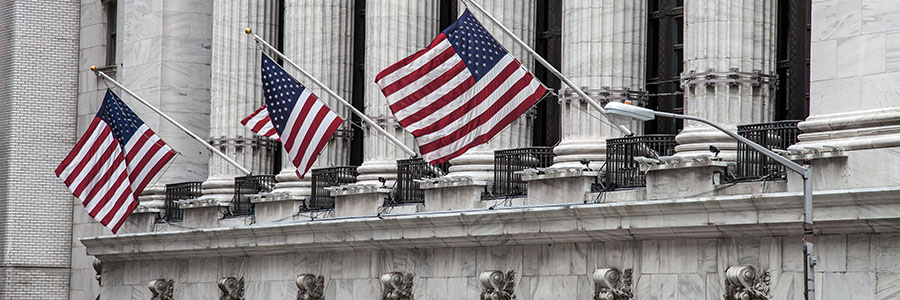What the Potential Elimination of the Chevron Deference Means to SEC Policymaking
In Episode 59, we discuss how the Chevron deference (or doctrine), which states that Courts "defer" to agencies in areas of ambiguity, is often tested in court when agencies propose rules that may exceed rulemaking authority. One case in particular could alter or eliminate Chevron and lead to a material erosion in the rulemaking powers of U.S. government agencies.
This podcast was originally recorded on February 13, 2024,
PETER HAYNES: Welcome to Episode 59 of TD Cowen's podcast series Bid Out-- a market structure perspective from North of 49. My name is Peter Haynes, and today, we'll bring back our resident legal beagle expert in administrative law JW Verret to discuss the implications of a case in front of the US Supreme Court that might impact the rule-making abilities of agencies of the US government such as the SEC.
By way of background, JW Verret is a professor in the Antonin Scalia School of Law at George Mason University and is an expert on administrative law and the SEC. J-dub, as you're known to your friends, thanks for coming back to the pod.
JW VERRET: Good to be back here. Thanks for having me.
PETER HAYNES: Well, the last time we spoke was right at the start of the term of the current administration the SEC led by chair Gary Gensler. And we had discussed at the time the question of whether the SEC had the power to ban payment for order flow completely. And your answer was a resounding yes. And you had lots of technical reasons to support your thesis, all ground in legal background.
In the end, the Gensler-led SEC chose a different path to attack the bilateral arrangements between retail trading firms and wholesalers, and as our listeners very well know, that remains a work in progress. Today, we're going to shift gears and discuss a case in front of the Supreme Court that could potentially alter the powers of government agencies such as the SEC that are in part supported by an administrative law doctrine known as the Chevron deference. J-dub, for our market structure nerd listeners, who probably very few of which ever went to law school, can you tell us all about what is the Chevron deference?
JW VERRET: So when you try to figure out the legal question of, Does an agency of the US government have the authority to do something? there's a couple of dimensions you got to focus on. First, constitutional, second, statutory. Does the agency have the constitutional authority to do what it's doing? And part of that is, if it's clear Congress tried to give them authority, did Congress have the constitutional power to give them that authority? And then second, were they actually given the authority to do whatever they want to do in the statute itself?
Because statutes are never clear and-- either because Congress is sometimes sloppy in drafting statutes and sometimes because Congress just can't anticipate everything, you run into fact patterns where it's not quite clear to anyone what exactly Congress meant, and whether it meant to encapsulate a particular set of circumstances when Congress drafted a statute.
So one of the concepts that judges have come up with is to say, well, when we're trying to figure out whether an agency has authority granted by Congress, and it's kind of unclear, it could go either way, it's kind of an even question, tie goes to the runner. We'll let the agency tell us what they think the grant of power is. How they interpret their own statute will give some deference to their own interpretation of their own statute. That's the Chevron doctrine.
And this was developed by Justice Scalia, who was, generally speaking, a conservative justice, during the Reagan administration. And I think the idea generally was that it tended to give the executive branch more authority during those times. But it has shifted in focus to generally give agencies authority in ways that have grown the code of federal regulations exponentially over that time frame. And I think the justices have noticed that.
When you notice that, like, average pages added to the US code of federal regulations increases by thousands and then tens of thousands, on an exponential pace of increase directly related to that doctrine, the judges take note of that. And so they've become increasingly skeptical of this idea of Chevron deference. And so we saw a recent case where it seems like a majority of the Supreme Court is skeptical of Chevron deference, wants to try a new approach that probably, I think, if we're doing predictions, isn't going to totally kill it and totally destroy the administrative state.
Libertarians can hope for that, but we'll probably be disappointed. Probably what it will be will be some tweaking of the doctrine so that there's a little bit less emphasis on the agency's interpretation, a little more skepticism than before. But I expect probably more of an incremental change in the doctrine rather than a whole scale shift.
PETER HAYNES: So you mentioned that Reagan administration was when Chevron deference was written. It was 1984, I believe. There's been thousands of cases that have cited Chevron. And now here we are 40 years later, and you mentioned that there's a case that's in front of the Supreme Court that threatens to change or eliminate Chevron. Tell us about the case of Loper Bright Enterprises versus Raimondo, which deals with main herring fishermen.
JW VERRET: Yeah, so I'm not an expert in the fishing regulations there. But I know the general idea of what's going on is that the federal government is telling these fishermen that they have to pay the cost of inspectors that come on their boat, even though the statute-- the underlying statute doesn't directly give this Maritime agency the authority to force the fishermen to pay for the cost of inspectors who come on the boat. That's the facts of that case. But the real import is whether Chevron deference generally is overturned, amended, changed.
The best way to think about this case is to think about a very similar case previously from a very closely related doctrine in administrative law called Auer deference-- A-U-E-R deference. This was another differential sort of doctrine in the law where courts would say, OK, an agency should be given discretion to interpret their own regulations.
Chevron is about an agency given discretion to interpret the statute passed by Congress that gives them power. That was a doctrine that gave the agency discretion to interpret their own regulations because sometimes those are vague too. And in reviewing that deference, the Supreme Court decided that, no, we're not going to get rid of that doctrine. We're just going to tweak it a bit.
That's why, I think, more than likely what probably happens to the doctrine of Chevron deference will be something similar, will be tweaking rather than wholesale revamping of the Chevron doctrine. But we shall see. But I think the real question you want to ask about is what does all this mean for SEC market structure regulation. Maybe I'm jumping the gun here.
PETER HAYNES: Yeah, I do. And I think, for the listeners that are, again, not lawyers like me, Auer is based on a decision Skidmore versus Swift and Company. I think as everyone always refers to Chevron, it's Skidmore versus Swift. And they refer to it as Auer deference, just to make sure I've got that fact right?
JW VERRET: Yeah.
PETER HAYNES: OK, so you mentioned your thoughts with respect to the outcome and what implications this has for the SEC. Given that Chevron grants powers to the agencies, eliminating or reducing these powers would seem to be consistent with libertarian type of an agenda or a right-leaning Republican agenda. How much of the decision that the Supreme Court will make do you think actually rests on the sort of six-three court that we have right now that leans towards the Republicans?
I mean, you've got-- if I remember correctly, one of the right-leaning judges Gorsuch was actually during his confirmation hearing asked about Chevron and was, I believe, a card-carrying person that says Chevron should be defeated. So do you think that the leanings of the court will matter with respect to this outcome?
JW VERRET: Yes is the basic answer to your question. But I would note that court watchers who put them into the partisan bucket of left or right or Republican or Democrat are really oversimplifying where the court comes down. Really the better way to characterize them is as originalist or not originalist. That tends to overlay on the political breakdowns often, but not always, and not necessarily and not by design.
So for example, if Chevron deference is substantially reduced, one of the things that will mean in the short-term-- if there's a Trump administration or a Republican administration in the near-term, what that will mean is that, as those agencies with the new Republican appointees try to do deregulation, they will face less Chevron deference in interpretation of their statutory authority to write those deregulatory rules.
So administrative law is a much more long-term game and it's much more grounded in constitutional concepts of originalism versus activist or living Constitution, or whatever you call it, judges. I would add that little bit of subtlety to it, but generally speaking, the answer to your question is yes.
PETER HAYNES: So let's narrow down the discussion to the agency that our listeners care about the most, and you mentioned that earlier, and that's the SEC as where market structure followers. So Chair Gensler has a very aggressive rule-making agenda in play, currently with at least 63 rules on his docket either in progress or finalized. Given the various potential outcomes that you can lay out for us, perhaps a tweaking as you had suggested earlier of Chevron, what happens to these rules as Chevron is either rewritten or eliminated? What are the rules that will stay, and what are the ones that will go?
JW VERRET: So no matter what happens to Chevron deference, if it's a slight modification or a massive revamp, this spells trouble for the overwhelming majority of Chair Gensler's agenda. The corporate governance related rulemakings, the more politicized rulemakings like climate change disclosure, those face a bleak future indeed. But for this audience, realize that market structure is special. Market structure is special for two reasons.
And if there is a bloodbath in the Gensler agenda as a result of changes in administrative law in the United States, market structure has a metal shield and a suit of armor that will keep it pretty well secure. That is my thesis.
PETER HAYNES: Just before we dig in on the market structure aspect, which I think you're going to tell us is protected by the 75 amendments, you mentioned that most of the Gensler agenda doesn't have that same coat of armor that you suggested market structure has and they will potentially be at risk. What about rules that have been previously adopted by any administration, whether it be Gensler or the previous administrations? If you get rid of Chevron or materially tweak it, do plaintiffs have a legal grounds to challenge rules that have been previously finalized?
JW VERRET: Sure, but they run up against statute of limitations. So I think it's probably unlikely that pre-Gensler rules would be challenged even if it might be easier to do them under administrative law doctrine.
PETER HAYNES: What's a statute of limitations in this case? Is there a term? I guess it goes back a certain number of years, or how does that work?
JW VERRET: I don't know offhand the number of years you have to challenge a particular SEC rule. You hit me with a pop quiz here. I don't know the answer to that one. I would guess, usually those statutes are three to five years, but I don't know the exact number on that one.
PETER HAYNES: OK, well, no, that's helpful. And just, again, one more final question here. For people that maybe don't fully understand how congressional rules are adopted, in the event Chevron is eliminated, the only way an agency like the SEC can adopt a rule that is outside of their existing statute is to have Congress grant specific powers to do so through passing of bills into law, which can be done rather easily, I think, when all three chambers of government are controlled by one party, but that is a rare outcome. How exactly would a new statute be written? Would these rules be attached to a bill like the Inflation Reduction Act or aid to Ukraine, or would these be standalone bills?
JW VERRET: One of the common strategies to try to get things done is to sneak it into an unrelated bill that is a piece of must-pass legislation that generally there's a bipartisan interest in passage. So people will no doubt try that.
PETER HAYNES: You mentioned that there's a coat of armor around the market structure rules. As our listeners know, the Gensler administration is working through four files. The first is the amendments to rule 605 for retail order execution disclosure. There's one on tick sizes access fees and transparency better priced orders. There's one on best tax, and then there's rules to enhance order execution, which is the controversial retail auction proposal, which was Gensler's alternative to completely banning PFOF.
Most industry observers are critical of the manner with which the SEC dumped these four separate rule proposals and 1,600 pages of support documentation because the individual rules did not consider how each of the other rules would intersect with that rule. As such, there's a view that the final rules will look a lot different than the original proposals or there will be lawsuits. What is your expected outcome? And can you explain how the SEC's market structure rules are different than all the other proposed rules that will fall to the wayside in the event Chevron is eliminated?
JW VERRET: Sure. And I would note that of the four, I think, the inner mess proposal, just by virtue of what it speaks to, is more foundational than the other three. I don't view it as necessarily interconnected in a way. I think if you're going to pick one, that one could move first, and the others kind of build off of the core in a mess reform.
But look, here's the pathway to get a regulation done. And Americans will remember the old commercial about how to pass a bill, "I'm Just a Bill." The bill was a personified cartoon. We should do one for I'm Just a Regulation.
PETER HAYNES: Yeah, I remember it we used to see the ABC Saturday Morning explanations where you had the little character on the steps of Congress explaining to everyone, including Canadians, how the US legal process worked.
JW VERRET: If you can do the animation, let's do one for "I'm Just a Reg," and the regulation makes it through the gauntlet. So first, the agency has to have the statutory authority to do something. Second, that congressional authorization has to be constitutional. Third, when the agency does a rule, it has to comply with the administrative procedures act for open comment and consideration of public comments.
And then related to that third step, a fourth step is that the statute the agency works under might put constraints on the agency in how it does a rule. One of the most notable ones in securities regulation is a set of economic cost-benefit analysis requirements the agency has to undertake. So let's talk about those four.
So first, with respect to statutory authorization-- so this is the coat of armour-- is the statutory authorization and market structure. The SEC's grant of authority is clearer than with respect to anything else that it does. So with respect to statutory authorization, not only the 34 Act but the 75 Act amendments are pretty specific about the SEC, particularly with respect to fees. No question, Congress had in mind fee regulation from the very beginning of its regulation of the stock exchanges in 1934, and was even more focused on it in 1975.
So we got that step pretty well clear. And then with respect to, is this constitutional? Is the grant of authority constitutional? A concept called the private nondelegation doctrine says that when the SEC oversees an SRO-- and in this case, the SRO is the exchanges-- the SEC needs to be in the driver's seat.
The SEC needs to have authority to tell the SRO which way to go and how to get there. I mean, it has to be specific. Otherwise, the SEC's grant of authority to a private entity is not constitutional because the nondelegation doctrine generally, and the private nondelegation version here says that government power has to be exercised by the government and the government can't outsource that power. And so if the government harnesses an SRO model to do some mission that it has, it needs to have plenary authority over that SRO.
So right there, constitutional law tells us that the SEC's oversight of the exchanges, particularly with respect to fee setting, has to be a plenary type of authority. Third and fourth, the administrative procedures act and the types of restraints put into the statute also help. So the second one, I would say, is my shield. The first one, the grant of authority, is the coat of armor. The constitutional concept of the private nondelegation doctrine is the shield.
And then third, I would say, with respect to the administrative procedures act and considerations the agency has to take into account by statute, that also cuts in the direction of flexibility for the SEC and in a mass and market structure rulemaking for the reasons that we discussed last time I was here. The statute gives the SEC the ability to take into account not only things like competition, efficiency, and capital formation, the cost-benefit analysis language the SEC operates under in the corporate governance rulemaking. It also allows the SEC to take into account the rather nebulous concept of fairness.
So that sets aside kind of the quantitative numeracy of the cost-benefit analysis quants and says, fairness considerations can trump. An analysis of conflicts of interest can trump in the SEC support of their rule for purposes of the administrative procedures act and for purposes of other statutory constraints on the SEC's rule making.
So you put that all together, and I would say, within the building of the SEC, if you're in corporation fin or investment management, you should be worried about Chevron. Yes, you should be very afraid. If you're working in trading in markets, call up your buddies at corp fin and say, huh, we're not too worried about Chevron. You get to gloat a little bit to your friends over at corp fin because your rulemakings at the division of trading and markets are pretty free and clear right now.
PETER HAYNES: You wrote a letter to the SEC in December of last year with respect to the market structure proposals honing in on fees. And you suggested that there was a case in a completely different agency, that the outcome of it would be a good example of the coverage that the SEC would have for adjusting fees. Can you tell us about the horse racing integrity and safety authority case?
JW VERRET: Yeah, this gave the authority to the FTC to oversee horse racing associations for safety regulation and for fees. And it put some minimal constraints on the FTC's authority to oversee the fee setting by these horse racing associations. And it put them in statute. So Congress clearly intended those limits on the agency.
But the courts in the Fifth and the Sixth Circuit and now the DC circuit is looking at this line of cases in its oversight of a FINRA challenge. And the courts in both circuits said, look, those constraints on the FTC in its oversight of these private associations are too much, a bridge too far for purposes of the private nondelegation doctrine.
If you're going to have this kind of a self-regulatory organization overseeing with the grant of any color of authority under law or under the FTC, then the FTC needs plenary authority over that self-regulatory organization. It's a direct analogy to FINRA and the DC Circuit judges in the Alpine case challenging FINRA's legitimacy. Honed in on it very quickly on their own. They didn't need me to remind them, even though that's what I'm trying to remind the SEC of in the comment letter.
And in the DC Circuit, judges said, look, it's pretty clear statute from these two other circuits that, in the same way, the SEC has authority over FINRA and over the exchanges needs to be a plenary kind of from scratch review of things like fee setting.
PETER HAYNES: So it's interesting here that the rules that will be finalized, it's almost the art of the possible. And SEC knowing they have a good defense, or in this case a coat of armor, you might want to call it, on fees suggests that will be maybe one of the rules that they actually go final with thinking that they can actually pass it through, and even if there is lawsuits, to be able to be confident that they will win in courts.
So I want to put you on the spot, J-dub, and ask you, if you're in that room with the nine Supreme Court judges, what will the actual document that they write on this case involving the herring fishermen actually say? I think, you're on the tweak rather than eliminate, but what do you think that actually looks like?
JW VERRET: I think it's tweak. But let's move the needle a little bit and say substantial tweak, not overturn but substantial tweak. And I think they'll try to categorize types of instances in which an agency interpretation of their statute is more appropriate and types of instances like this one, where the agency just completely made up the authority to put inspectors on boats and cause the boat to pay for the cost of the inspector, which sometimes is crippling for small boats.
So I think they'll try to categorize different types of instances in which the agency's interpretation is just kind of ridiculous versus when it's more reasonable, particularly in different contexts or different types of statutory authority. I don't know what those categories look like in my mind but that might be a reasonable way to try to approach it.
PETER HAYNES: So we will hear from the Supreme Court a ruling on this case, which I believe the hearing was about two or three weeks ago and I'm assuming we'll hear before the end of-- before they break for the summer. J-dub, I want to say thank you for your time today. We're very curious to see how Chevron plays out. And it is extremely interesting that the market structure aspect of the SEC's rule making may be protected here regardless of the outcome of Chevron. So again, thanks for taking the time today to join us. And I'm sure we'll be having you back on the next time we need to talk about legal doctrine.
JW VERRET: Yeah, thanks for having me. Thanks for including somebody from the lower 48, and always good to be here with you.
PETER HAYNES: We're up here in Canada, and we do know a lot about US politics. One of my colleagues, Chris Krueger, who works in Washington for Washington Research Group, part of Cowen, likes to joke when he comes to Canada. The people he speaks to know more about US politics than the people he visits in the US. And that might apply to the SEC too. Canadians take a great interest in your regulatory environment. So thank you again. And have a great day.
JW VERRET: Thank you so much you too. Take care.
[MUSIC PLAYING]
This podcast should not be copied, distributed, published or reproduced, in whole or in part. The information contained in this recording was obtained from publicly available sources, has not been independently verified by TD Securities, may not be current, and TD Securities has no obligation to provide any updates or changes. All price references and market forecasts are as of the date of recording. The views and opinions expressed in this podcast are not necessarily those of TD Securities and may differ from the views and opinions of other departments or divisions of TD Securities and its affiliates. TD Securities is not providing any financial, economic, legal, accounting, or tax advice or recommendations in this podcast. The information contained in this podcast does not constitute investment advice or an offer to buy or sell securities or any other product and should not be relied upon to evaluate any potential transaction. Neither TD Securities nor any of its affiliates makes any representation or warranty, express or implied, as to the accuracy or completeness of the statements or any information contained in this podcast and any liability therefore (including in respect of direct, indirect or consequential loss or damage) is expressly disclaimed.

J.W. Verret
Associate Professor, Antonin Scalia Law School, George Mason University

J.W. Verret
Associate Professor, Antonin Scalia Law School, George Mason University

J.W. Verret
Associate Professor, Antonin Scalia Law School, George Mason University

Peter Haynes
Managing Director and Head of Index and Market Structure Research, TD Securities

Peter Haynes
Managing Director and Head of Index and Market Structure Research, TD Securities

Peter Haynes
Managing Director and Head of Index and Market Structure Research, TD Securities
Peter joined TD Securities in June 1995 and currently leads our Index and Market Structure research team. He also manages some key institutional relationships across the trading floor and hosts two podcast series: one on market structure and one on geopolitics. He started his career at the Toronto Stock Exchange in its index and derivatives marketing department before moving to Credit Lyonnais in Montreal. Peter is a member of S&P’s U.S., Canadian and Global Index Advisory Panels, and spent four years on the Ontario Securities Commission’s Market Structure Advisory Committee.




